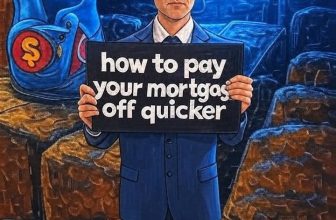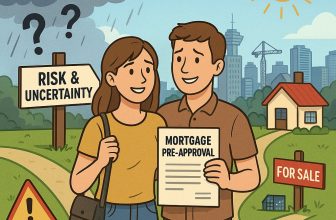(March 24, 2024)
Don’t want to miss out on the next blog post? Click Here to have future issues emailed directly to your inbox!
In Canada’s ever-evolving real estate landscape, first-time homebuyers are constantly grappling with the ongoing challenges of affordability. Rather than dwell on the perceived unfairness of the market, I’ll instead share insights gained from my extensive dealings with this group. Firstly, I’ll reveal the common mortgage qualification struggles they encounter. Then, I’ll delve into the common approaches and evolving strategies of first-time homebuyers that are proving successful in today’s challenging market.
Depending on which part of the country you reside in, you are likely well-versed in Canada’s challenging real estate landscape, so I’ll keep this list abbreviated and precise. There are a few major challenges that first-timers have to contend with in Canada’s largest and most active markets: Vancouver, Toronto, and Calgary:
Large Down Payments
Vancouver and Toronto are by far the most challenging real estate markets in Canada, especially for first-time buyers. With price trajectories still elevated and no signs of heading in the opposite direction (not substantially anyway), down payments remain the number one challenge for first-time homebuyers. The minimum down payment required to purchase an owner-occupied principal residence in Canada is 5%, but only up to a purchase price of $500,000. Any portion of the purchase beyond $500,000 (and less than $1M) requires a top-up down payment of 10%. And finally, for properties valued at $1M or greater, the minimum down payment escalates to 20%. Gifted sources of down payment (proceeds from direct family members) continue to be a key component in the overall qualification of first time home buyers in Canada. In summary, here are some tiered minimum down payment examples: for a $400,000 property the minimum down payment is $20,000, $65,000 for a $900,000 property and for a $1.1M property, $220,000.
Property Transfer Tax
On top of the minimum down payment tiers, Ontario and BC additionally incorporate substantial Property Transfer Taxes that are due upon completion of the purchase. Here is how much you can expect to pay as a first-time homebuyer for an average-priced condo in Toronto ($695k) and Vancouver ($827k); in Toronto $12,275 and in Vancouver, $6,540 (these figures are as of April 1, 2024 when BC’s new Property Tax rules come into effect). Click on the following links to be redirected to the respective provincial jurisdictions’ property transfer tax calculators: British Columbia, Ontario. There are indeed First Time Home Buyer exemptions and rebates, but they are only available up to a specified purchase price. In BC (effective April 1, 2024), purchases up to $500,000 will receive full exemptions and purchases between $500,000 and $860,000 will receive partial exemptions (Click Here to be redirected to the Property Transfer Tax Calculator of one of Vancouver’s leading legal real estate firms). In Toronto, you are eligible for a full rebate ($4,475) for purchases up to $400,000, but for the rest of Ontario, that rebate is decreased to $4,000 up to a maximum purchase price of $368,333. And finally, there’s Alberta… where there’s no property transfer tax to speak of!
Lack of Inventory
You might be all good on the qualification front but find that the availability of listings in your region is either limited or diminishing. This only hinders the purchasing cycle further as your mentality morphs from innocent-dreamy-property-shopper to fierce-analytical-viking-buyer. Tight markets create stress and force you into situations you haven’t financially prepared for. In competitive markets, it is especially critical to align yourself with top-tier mortgage brokers, real estate agents, and lawyers.
High-Interest Rates
On top of current elevated rates, many forget that a 2% stress test method is applied when qualifying for a mortgage in Canada. Interest rates are definitely on the decline, but prospective homeowners need to stay light on their feet in anticipation of a potential counteraction that the real estate market will heat up as rates begin their descent. Many prospective homebuyers are “rolling the dice” in today’s environment accepting short-term pain (in the form of still high interest rates) for long-term gain.
FIRST TIME HOME BUYER STRATEGIES AND TIPS
INTEREST RATES
When it comes to interest rate selection, there are two camps; short-term fixed and variable. Both are sound approaches, but for first-time buyers, the fixed-rate approach seems to be the prevailing choice simply for the reason that it generates the best return for your qualifying amount. Although the outlook for variable rate mortgages is promising, the current rate of prime in Canada (7.20% as of the date of this article) significantly diminishes your qualifying amount. At the moment, the rate variance of a variable and fixed-rate mortgage could be as high as 2%, which equates to a qualification difference of up to 15%. For example, an applicant with a $100,000 annual income would qualify for a $408,000 fixed-rate mortgage, but under the higher variable rate, the maximum qualification would decrease to $365,000.
DOWN PAYMENTS
Currently in Canada, the minimum down payment is 5% up to a purchase price of $500,000, then 10% on the balance thereafter up to $999,999. For purchases that are $1M or greater, the minimum down payment threshold is 20%. For down payments less than 20%, qualification criteria are rigid and non-negotiable (your qualification amount should be similar to virtually every lender in Canada). However, for down payments that are 20% or greater, qualification guidelines loosen considerably and qualification amounts vary significantly from lender to lender. Interest rates are negotiable regardless of the amount of your down payment, but qualification amounts are only negotiable when down payments are 20% or higher. Acceptable forms of down payment: own sources and gifted proceeds (from family members). Proceeds from borrowed sources are not acceptable forms of down payment (i.e., personal line of credit).
CO-SIGNERS
Co-signers are becoming increasingly common amongst first-time home buyers in Canada. An important thing to note about co-signing is that it doesn’t have to be a forever thing (for the co-signer). As soon as the primary applicants can show evidence that they qualify for the mortgage on their own, the co-signer can be removed. This could be enacted at any time throughout the life of the mortgage. Ask your mortgage broker to provide exit scenarios for your co-signer; this will make all parties more comfortable with the transaction.
TRY TO PURCHASE A PROPERTY WITH A RENTAL SUITE
This might be difficult in some markets, but if possible, give this some serious thought. A property with a rental suite could offer a pleasant qualification boost for a first-time home buyer. For example, with a $100,000 annual income, you could max out with either a $400,000 property without a rental suite, or you can explore property types with rental suites in the $600,000 range. Both outcomes are possible, but the latter receives an additional qualification boost as the rental income of the suite provides additional eligible qualifying income.
VERIFIED MORTGAGE PRE-APPROVAL
With so much at stake in today’s highly competitive market, it is critical to align yourself with a top-tier mortgage broker. Just as an athlete prepares for a championship game, a buyer should also enter a market fully prepared and informed. One should expect the following to be included in a pre-approval:
- Request a verified mortgage pre-approval from your mortgage broker. A verified mortgage pre-approval means that the application has been underwritten. Many mortgage pre-approvals are unverified and underwritten only when a live offer is presented – this defeats the sole purpose of a mortgage “pre-approval.” A verified mortgage pre-approval firmly calculates your maximum purchasing power and eliminates any unknown variables.
- Multiple qualification scenarios should be included in your pre-approval. For example, let’s say you have an unspecified amount of debt. There should be a qualification scenario with the debt factored in, and another scenario without the debt. Or perhaps you would like to see an additional scenario that displays how much more you would qualify for with a co-signer. Regardless of how many scenarios you are curious about, don’t hold back in requesting them! If your mortgage broker is annoyed with your requests, then find another.
- Interest rates. Both fixed and variable interest rates should be included in a mortgage pre-approval. And equally important, the maximum qualification amount should be displayed for each.
- Terms and Conditions. This is an absolute must. Whether you agree or disagree with them, the conditions need to be displayed openly in the pre-approval document. Acknowledging your restrictions and limitations ensures that you are swift and efficient throughout your shopping and negotiating phase.
- Request touch-ups to your pre-approval. Don’t be shy to inform your mortgage broker if things have changed throughout your property search. For example, if you’ve been pre-approved based on $2,000 annual property tax estimates but are finding that the range is actually $1,800, inform your mortgage broker and have them adjust the qualification accordingly. This difference will result in a higher qualification amount. The increase could be marginal, but every dollar counts in a competitive market.
- Your pre-approval should contain at least 750 words and various mathematically derived tables and scenarios. The document should be dense and loaded with information.
- Lastly, your mortgage broker should be available outside standard banking hours. Purchasing a property is a dynamic experience, and the pursuit of it is often in the evenings and weekends. Your mortgage broker should be available (within reason) to service general inquiries and emergencies regardless of the time and day.
Do you have a verified mortgage pre-approval? Call or text Marko Gelo right now at 604-800-9593, or Click Here to schedule a free, no-obligation phone call with Marko. You can also call Marko on WhatsApp.
Download my amazing Mortgage App…it’s loaded with calculators and tonnes of useful information!
Don’t want to miss out on the next blog post? Click Here to have future issues emailed directly to your inbox!
Contact Marko, he’s a Mortgage Broker!
604-800-9593 cell/text | Vancouver (Click Here to schedule a call with Marko!)
403-606-3751 cell only | Calgary (Click Here to schedule a call with Marko!)
Download my award winning Mortgage App on your phone
Email: gelo.m@mortgagecentre.com
@markogelo (Twitter)






